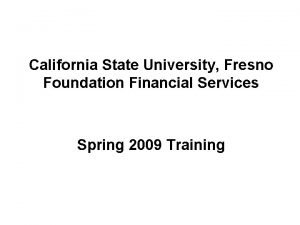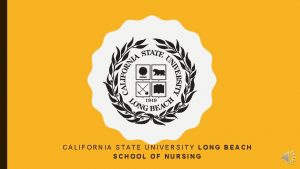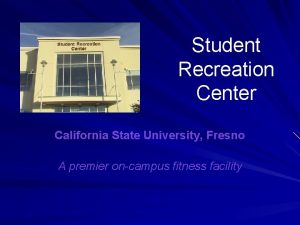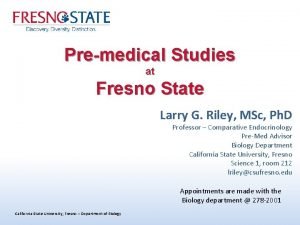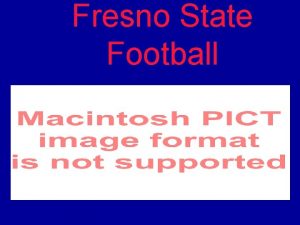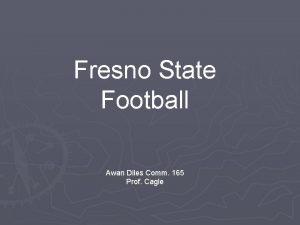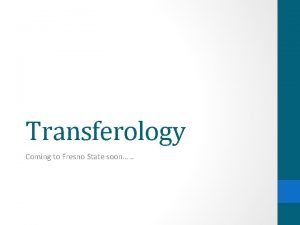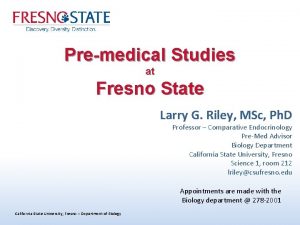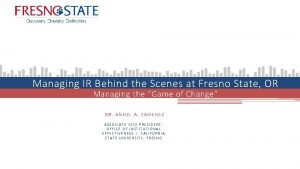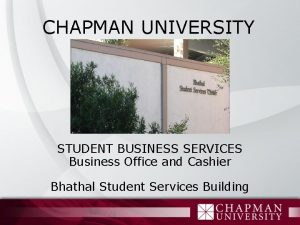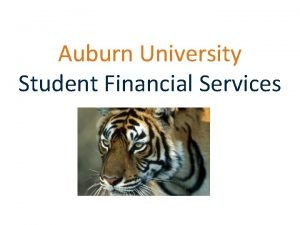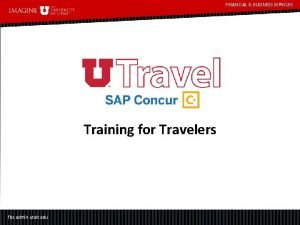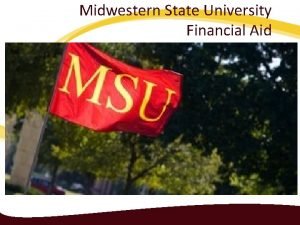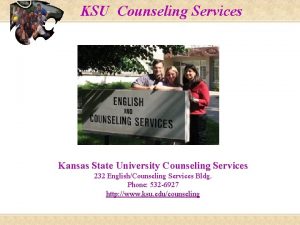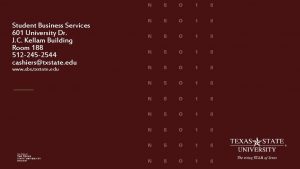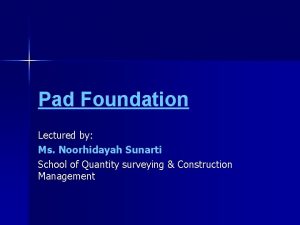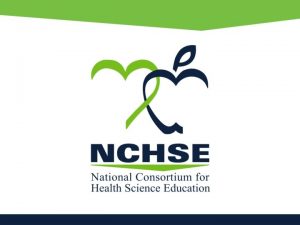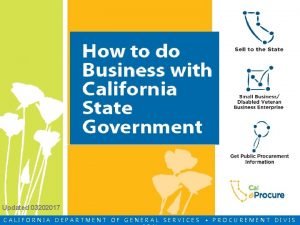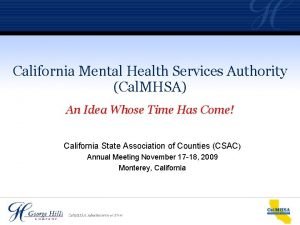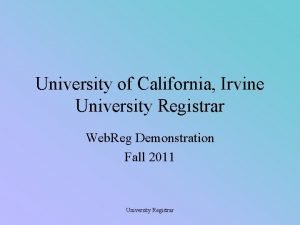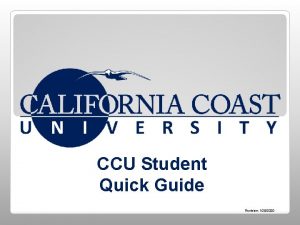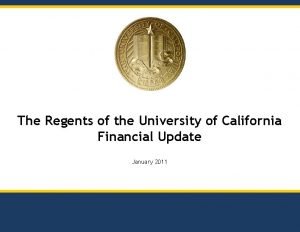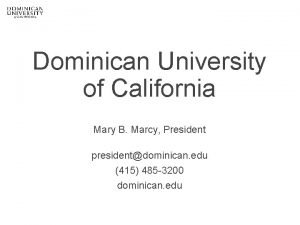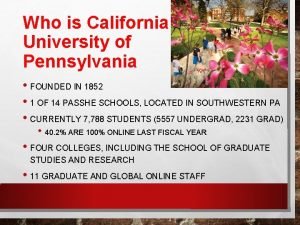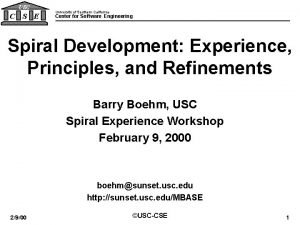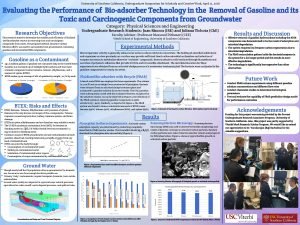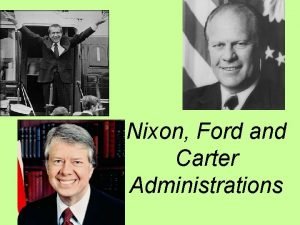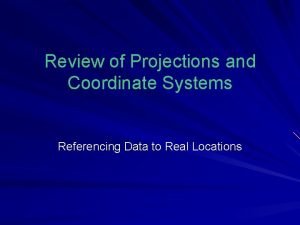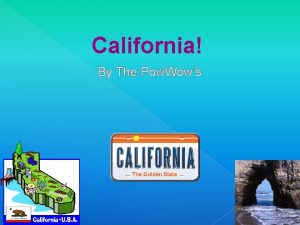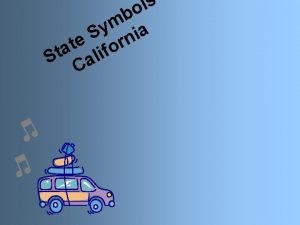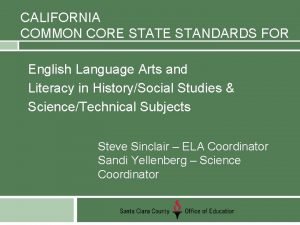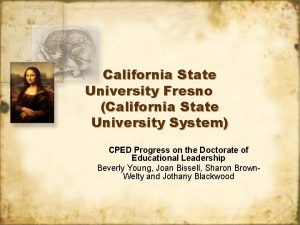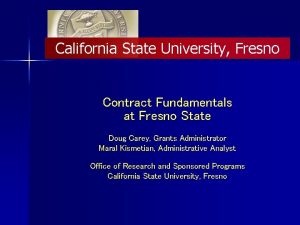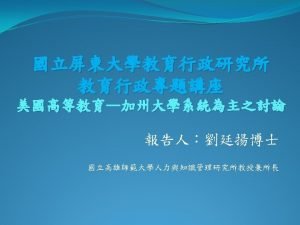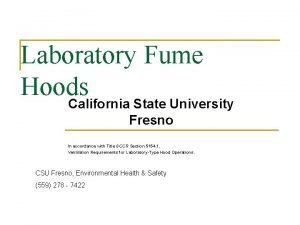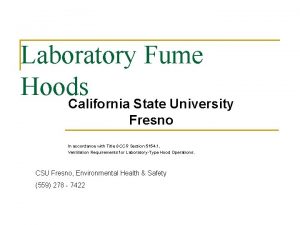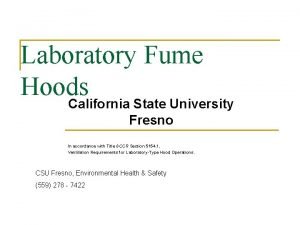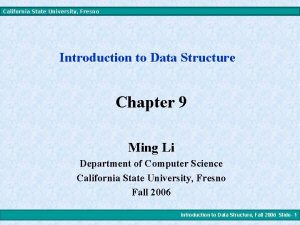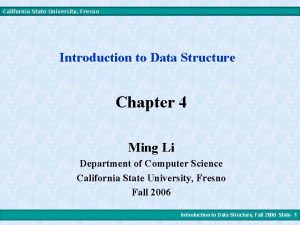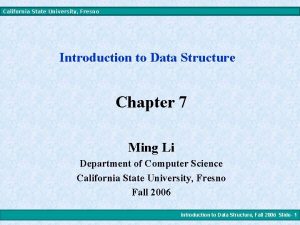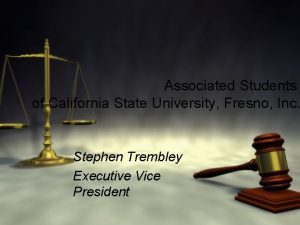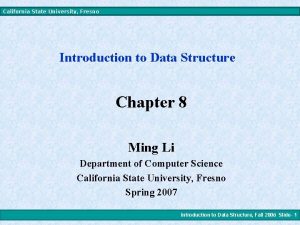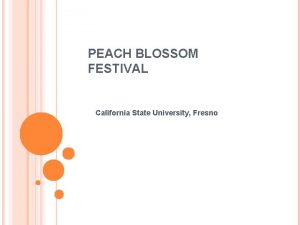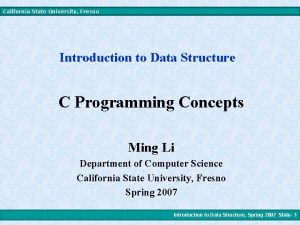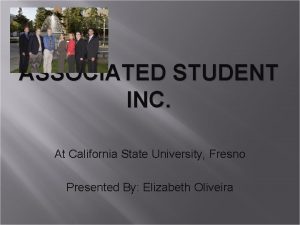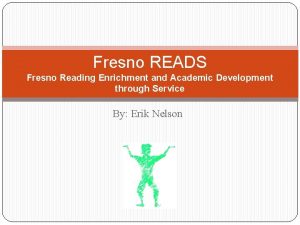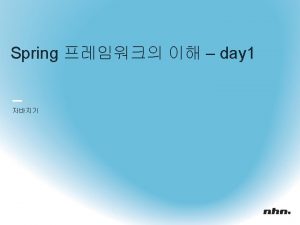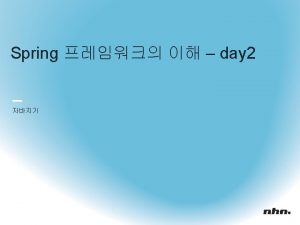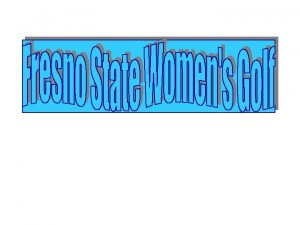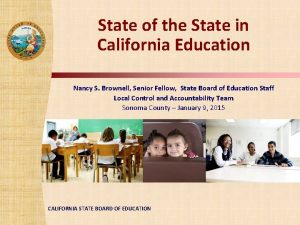California State University Fresno Foundation Financial Services Spring

































- Slides: 33

California State University, Fresno Foundation Financial Services Spring 2009 Training

Foundation Website Located under the Auxiliary website: http: //www. auxiliary. com/ The purpose of The Foundation Financial Services is to provide the highest quality financial services available to the California State University, Fresno campus community and other Foundation stakeholders. • Major Functions – Manages the financial activities relating to: • Sponsored research grants and contracts administration • Gift and donation acceptance and management, and related scholarship and loan accounts • Oversight of Foundation investments, including endowment portfolio • Fiscal agent of trust accounts to support University campus programs

National Trends on Post Award Issues • • • E-Verify Cost Transfers Effort Reporting False Claim Allegations Lessons Learned Stimulus Funding

E-Verify • The government wants to ensure that it does not do business with companies that employ unauthorized aliens. • Universities will be required to use the Department of Homeland Security’s E-Verify system for federal projects. The effective date has been delayed until June 30, 2009. • It will only affect new contract awards after June 30, 2009 that includes the Federal Acquisition Regulation (FAR) E-Verify clause. • E-Verify is a free internet-based service operated by Department of Homeland Security (DHS) and Social Security Administration (SSA).

E-Verify • Auxiliary Human Resources has enrolled in the E-Verify system. • The employer completes and I-9 form on the employee and enters into the system the following information: – Employee Name – Date of Birth – Social Security Number – Citizenship Status – Type of Document (e. g. birth certificate, passport, etc. ) • E-Verify searches and compares this information against DHS and SSA databases, and the individual either is or is not confirmed as being authorized to work in the United States.

E-Verify • Contractor and Subcontractor will be required to enroll in E-Verify within 30 days of the contract award and to initiate a verification of employees within 30 days of enrollment. Contractor will continue to use the system for the life of the contract. • After the initial contract start-up phase, newly hired and newly assigned employees must be verified within three business days. • For more information pertaining to E-Verify contact: – Auxiliary Human Resources – www. dhs. gov/everify

Cost Transfers • Audit Target • Transfers of unallowable costs between projects are common. • These transfers of unallowable costs are often made to use unexpended funds from a project, as a source of available funding for overspent projects or as a source of funds to complete projects. • Excessive number - “Why can’t you charge the correct project the first time? • Near or after the end of project – Presumption is that the costs are unallowable. • Appearance of moving deficits to another project – Difficult to adequately defend in an audit. • Salary cost transfers after effort is certified – Auditors view this as highly suspect.

Cost Transfers • Inadequate explanation – “to charge correct project” or “to correct error” would not be considered sufficient documentation in an audit. Proper documentation would include: • Adequate explanation of the specific nature of the error. • Reason for the cost transfer • Way in which the error occurred • 90 days or more have passed – include reason why the transfer was not processed in a timely manner and how the situation will be prevented in the future.

Cost Transfers (cont. ) • Transfers made more than 90 days after discovery of error. Auditors expect: • Review the charges on a monthly basis. • Approval of these transfers should be made on a exception basis. Above all, careful written documentation is a key to successfully defending these transfers.

Effort Reporting • NSF/OIG -Effort Reporting Audits of UC California Berkeley & San Diego The audit suggested that: • Salary charges did not have appointment letters documenting employee institutional base salary rates. • Employees were engaged in activities that did not always directly benefit the grants paying their salaries • Salary charges were not verified using a “suitable means of verification”. Further the reports were found to be certified late or had inadequate documentation. OIG recommended: • Universities hold senior management officials, such as department chairs, accountable for timely completion of effort certification reports.

Settlement with Yale of False Claim Allegations • Yale University has agreed to pay $7. 6 million to resolve allegations that it violated the False Claims Act in the management of federally funded projects. Yale produced more than a million pages of documents in response to governmental requests for information. • The investigation centered on allegations of two types of improper charges to federal grants: – Cost Transfers • Improperly transferred charges to a federal grant account because the federal grant was near its expiration date and they needed to spend down the remaining grant funds. – Salary Charges • Submitted time and effort reports for summer salary and wrongfully charged 100% of their summer effort to federal grants when, in fact, the researchers expended significant effort on unrelated work.

Clerical/Administrative Costs “Lessons Learned” • OMB Circular A-21 prohibits direct charging of clerical and administrative salaries except in the case of “major projects”. • HHS/OIG recently released the results of its latest audit of direct charging of clerical and administrative costs and other costs that normally are treated as “facilities and administrative costs”. • OIG questioned approximately $28, 000 and based on these samples extrapolated approximately $2. 4 million in disallowed costs. • Duke University was able to get it reduced to approximately $1. 7 million after providing additional documentation. • University questioned the extrapolation, however, OIG stated it is a long standing policy to use statistical sampling techniques and recommend recoveries based on sample results where the universe is large.

Stimulus Funding American Recovery and Reinvestment Act (ARRA) Reporting Requirements • • • Large amount of funding with a large reporting burden. Must report within 10 days of the end of each calendar quarter Must include the following information: – – – Amount of recovery funds received Amount of funds obligated and expended Name of Project or Activity Description of Project or Activity Evaluation of completion status of the project or activity Estimate of number of jobs created and number of jobs retained by the project or activity. – Subawards made by the recipient

CSU Trends on Post Award Issues • Assembly Bill 20 (AB 20) – Requires State of CA and CSU to negotiate standard terms and conditions in contracts. – CSU representatives will meet with UC and legal representation to discuss further. • Gifts vs. Grants – CSU has a task force that is currently working together to draft a system wide policy. • FRESCA -The California State University system's web-based database of the research expertise, scholarship, and creative activities of faculty and affinity groups across the 23 campuses of the CSU. • ICSUAM – Integrated CSU Administration Manual Section 6000 – Research and Sponsored Programs Administration

PI Handbook Located on the Foundation Website: http: //www. auxiliary. com/Foundation/PIHandbook. shtml Forms and Policies: http: //www. auxiliary. com/Foundation/forms. shtml JD Edwards Training Guide Contact Information

General Information • Foundation’s Role üActs as liaison between Principal Investigator (PI) /Project Director and contract agency üAssists with maintaining budget, contract interpretation, follow-up with discrepancies üFiscal accounting services, monthly financials üFacilitates personnel/payroll functions üPrepares Purchase Orders, distributes checks üMonitors account expenditures for allowability, allocability, and reasonableness üFiles required fiscal reports

PI’s/Project Director’s Role After Grant/Contract is Awarded Fiscal Responsibilities • Formulate an annual program budget. • Authorize all expenditures and expenditure approval authority. • Review and monitor financial obligations and expenditures for accuracy. • Report financial activity to the Grant Accountant on a timely basis, reporting changes/revisions scope and budget.

PI’s/Project Director’s Role After Grant/Contract is Awarded Programmatic Responsibilities • Establish procedures for the efficient management of all programmatic issues • Ensure that the program goals are met • Formulate a financial budget • Submit programmatic reports to funding agencies on a timely basis and provide copies to the Foundation • Assure that any and all programmatic responsibilities with regards to individual grant or contract are performed and completed, including those involving subrecipients and subcontractors. • Invoices submitted for detailed, related program work.

Foundation: Account Set-Up • • Direct Costs Indirect Costs (F&A) Account Signature Authority JD Edwards (JDE) Financial System

Personnel Cost Methods • • • Time Voucher – hourly time sheet Released Reimbursed Time Computation Agreement (RTC) – reimbursement of wages and benefits to the employees’ department from the sponsored program for university staff/faculty released from their university assignment Additional Pay from Sponsored Programs for faculty Overload/Summer Pay – use Time Voucher

Released Reimbursed Time Computation (RTC) • Complete one form for each semester as budgeted • Use correct Object Code – refer to JD Edwards system • Use Special Notes section for salary or benefit unusual budget limitations • The Chair or Dean’s Office Staff should complete Peoplesoft ID numbers to avoid delays • Enter Grant/Contract Budget amounts from the approved budget for the correct time period

Overload and Summer Pay – Time Voucher • Fully complete the Time Voucher form, particularly note section C. • Student Assistants can work 20 hours maximum for combined total employment from Foundation/Auxiliary/University. • Overtime pay on sponsored programs generally needs approval from the funding agency. • Absence of Time Voucher/payroll activity for three months will require a new Employee Information Form submitted to Foundation prior to payroll processing.

Effort Reporting • Effort is the proportion of time spent on total professional activities such as research, teaching, administration and service for which an individual is employed by the recipient. • Effort reporting describes the allocation of activity, while payroll is the allocation of wages and salary. • Complete the applicable effort form located on the Foundation Forms Website for the appropriate time period described in the PI Handbook.

Effort Reporting (cont. ) • Policies that govern ü APM 504 ü OMB Circular A-21(2 CFR Parts 215 and 220) federal guidelines • Issues pertaining to Effort Reporting ü University and Auxiliary Effort combined during Academic Year (AY) – can include two different payroll systems ü 100% effort – can include cost shared time ü Proposed effort in the proposal stage balanced with assignment ü Committed effort according to award can vary from proposal ü Greater than 100% effort consequence ü Budget revision required to the level of effort provided • Refer to PI Handbook under Effort Reporting and guidelines and Forms located at: http: //www. auxiliary. com/Foundation/forms. shtml

Travel Policy and Practices Foundation Travel Policy, Travel Notification form, and Travel Expense Claim form: http: //www. auxiliary. com/Foundation/forms. shtml • Travel Policy similar to CSU Travel Policy • Travel Notification Form – ü Reports travel is authorized by appropriate Director(s) for time period, personnel, and fiscal management ü Allows consideration of potential liability issues ü Lists time periods for any travel: for on-going periodic basis or specific dates ü Required for international travel ü May be audited

Travel Expense Claim Form • Travel Advances – discouraged. If necessary: approved by Dean to expedite more quickly. Attach authorized Travel Notification. • Cash advance can be made on Foundation sponsored credit card. • Purchase Order accepted Travel Shoppe for airline tickets. Attach approved Travel Notification. • Current restrictions on trust account travel per CSU Administration directive.

2008 -09 Travel Freeze Guidelines For Trust Accounts These restrictions do not apply to sponsored programs except for International Travel • All International travel - approval by Dean, Academic Resources/VP, AVP Financial Accounting, Office of the President. Generally, sponsored program travel will be approved. Trust Account Travel: Other travel out of 48 contiguous states prohibited • Conference attendance – Presenter of a paper or program – Officer/active committee member of sponsoring association • • Under two days Director/Dean approval Under $1, 000 Dean’s authorization $1, 000 -$2, 500 Provost/VP approval & written justification by Dean Over $2, 500 discouraged, Provost/VP approval with substantiating written justification by Dean

Community Relations Authorization Form • Explain specific purpose of educational mission of university under purpose – Membership & community participation in activities of community groups – Promoting/maintaining student, faculty, staff, morale and development – Official guest accommodations in order to provide participation in community relations objectives of Foundation or University

Primary Community Relations Activities Key Points: Events, Food-related, Gifts • Conference/event registration • Cost of conference setup (supplies, meeting refreshment, facilities) • Meeting where a meal is served – sponsored program guidelines may not allow meals. – Meeting necessary to disseminate specific information described (not daily reimbursement of lunch) – Attach receipts – List date of event, location information, guests – Attach agenda for meeting, describe detail context of meeting – Alcoholic beverages if served and allowed (not allowed on sponsored programs/grants) – Attach calculator tape if multiple items to match grand total • Gifts are usually not allowed on sponsored programs

Purchase Orders Foundation Procurement Policy and Purchase Order Form: http: //www. auxiliary. com/Foundation/forms. shtml • Procurement Policy ü Outlines management, policy, and regulations governing Foundation purchases. • Purchase Order Form ü Purchase price limits require vendor price quotes, sole source written justification, purchasing agreements, and other documentation attached to form as applicable to policy guidelines. ü Time sensitive discounts are to be highlighted for proper and timely review. ü Shipping address indicating delivery location is required. ü Computer equipment purchases require prior approval from Auxiliary MIS. ü Allow additional time for legal review and executive committee approvals for equipment purchases over $20, 000 per policy guidelines. ü Check for procedural updates regarding forthcoming Accessibility Technology Initiative requirements for purchases particularly noted for: copiers, technology purchases, instructional materials.

JD Edwards/Rumba • Demonstrate features

Auxiliary Human Resources • Auxiliary Human Resources website located at: http: //www. auxiliary. com/HR/index. shtml (559) 278 -0865 ü Recruitment/Selection ü Benefits ü Classification ü Employee Relations ü Workers Compensation-Safety Training ü Payroll Services

California State University, Fresno Foundation 4910 N. Chestnut, Fresno, CA 93726 -1852 (559) 278 -0850 http: //www. auxiliary. com Linda Christian, Grant Accounting Supervisor (559) 278 -0852, lindacar@csufresno. edu Jane Stewart, Grant Analyst (559) 278 -0904, jastewart@csufresno. edu Wilma Satterberg, Grant Accountant (559) 278 -0851, wsatterb@csufresno. edu Nathan Zanoni, Grant Accountant (559) 278 -0844, nzanoni@csufresno. edu Shelby Gonzales, Grant Accountant (559) 278 -0862, sagonzales@csufresno. edu
 Csu fresno foundation
Csu fresno foundation California state university long beach nursing
California state university long beach nursing Student recreation center fresno state
Student recreation center fresno state Fresno state personal statement
Fresno state personal statement Fresno state bulldog stadium seating chart
Fresno state bulldog stadium seating chart Comm 3 fresno state
Comm 3 fresno state Fresno state ge sheet
Fresno state ge sheet Fresno state cls program
Fresno state cls program Fresno state tableau
Fresno state tableau Chapman university student business services
Chapman university student business services Auburn university financial services
Auburn university financial services University of utah financial and business services
University of utah financial and business services Midwestern state university financial aid office
Midwestern state university financial aid office Four seasons korean movie
Four seasons korean movie Autumn winter months
Autumn winter months Ksu counseling services
Ksu counseling services Texas state student business services
Texas state student business services Pile foundation details
Pile foundation details Foundation standard 1 academic foundation
Foundation standard 1 academic foundation California department of general services
California department of general services Cal mhsa
Cal mhsa Webreguci
Webreguci Ccu final exam schedule
Ccu final exam schedule University of california
University of california University of california
University of california California university of pennsylvania global online
California university of pennsylvania global online University of southern california
University of southern california Usc undergraduate symposium
Usc undergraduate symposium Regents of university of california v. bakke
Regents of university of california v. bakke Ca state plane zones
Ca state plane zones California's state motto
California's state motto California state animal
California state animal State of california dgs
State of california dgs California content standards english
California content standards english
